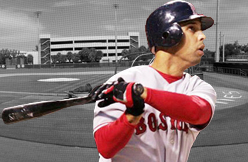NEW YORK -- Two stools were positioned against the railing just to the home-plate side of the visitors' dugout at Citi Field late Saturday afternoon, probably to be used by a television crew for interviews. As the Mets took batting practice, though, one of the stools was occupied by a man with a Nationals uniform, a Mets past and a promising future. Someday Alex Cora will be interviewed, just not yet.
Opposing managers occasionally take a pregame seat in the same area for the purposes of surveillance. They can monitor BP and try to pick up something about a player's swing or a limp, some weakness or flaw that can be exploited.
On this day, Cora was the monitor. He was in position to kibitz with former Mets mates and to see what he could see about them. It was high-tech espionage, but you never know.
Wayne Hagin, the Mets' announcer, happened by, renewed his acquaintance with Cora and said, "When he was managing, Roger Craig once told me never to stand in front of the manager when he's here, and since you're going to be a manager, I'll keep moving."
Hagin and a majority of folks in the game are sure Cora someday will assume the position of manager. When he's done serving as a middle infield understudy and tutor, Cora will move a few feet to the his left and to the top step of some dugout and probably do some team proud as a rookie skipper. He comes equipped for the job now, though the club that eventually will employ him undoubtedly will insist he serve an apprenticeship in the Minor Leagues.
The Mets became confident Cora was equipped when he spent the better part of the 2009 and '10 seasons on their roster. The Nationals have seen the potential, too. Indeed, Mike Rizzo, their GM, said this about that Saturday: "Alex still has a lot left in his tank as a player. But he has my number, and when he's done playing, he can make a call. It will be well-received."
For now, Cora is well-received as the team sage, a role he filled more than adequately for the Mets when others were unwilling or unequipped to do so.
"He and [Matt] Stairs run the place," Rizzo said.
It's called veteran presence.
"For a long time, I wanted him on my team," the general manager, in his third year as the man with two uppercase letters as his job title, said of Cora. "A left-handed bat who can play second, short and third, and almost as important, we have the two kids -- [Ian] Desmond at short and [Danny] Espinosa [at second] who can learn from him. We couldn't choose a better guy to mentor them.
"He had them both out on the half field [a full infield with a miniature outfield] every morning in Spring Training before anyone else got there. I didn't know about it for weeks. He does things like that. I think it comes natural to him to be a teacher."
Extra preparation never hurts. Cora has been preparing to manage for 35 years. Even last August, when the Mets released him, was preparation. A manager should know his players are experiencing. He should know what being released is.
"It's not enjoyable," he said. "But I can check that off the list now."
Before he signed with the Nationals, Cora was approached about managing -- in the Minor Leagues -- over the winter. The assignment with a team he preferred not to identity would have been Class A. He declined, telling the interested party, "I can still help your big league team."
And he could have managed in winter ball, but he opted to play with his hometown team, Caguas in Puerto Rico, after his older brother Joey advised him that managing in winter ball would change how big league clubs viewed him.
"You'll never play again," big brother Joey told him.
Joey Cora is the White Sox third-base coach, and he also is regarded as managerial material. He managed Caguas, and Alex played for him.
"He'd kind of take a day off once in a while," the younger Cora said, "and I'd manage."
The sage quality showed itself as Cora sat on the stool.
"The good teams get better as the season goes on," he said. "Look at the NBA, the Lakers won, what, 10 of 11 after the All-Star game? They've lost a few in a row now, but they made their statement. Look at Charlie Manuel's record in September with the Phillies. You need to get better as the season goes on. We will."
He sounded like a manager already.
Managers need to be tactful at times. So Cora practiced tact Saturday. Left unsaid or at least unexplored as he sat on the stool was how the Mets have fared late in recent seasons. He abided by "If you can say something nice about someone ... " and noted how much the absence of Carlos Beltran undermined the Mets.
He thinks like a manager, too.
Davey Johnson is one of Rizzo's advisors. The former Mets manager has been at Citi Field to witness the three-game series. Johnson was a second baseman and managed Cora with the Dodgers in 1999 and '00, when Cora was a plebe.
"I put him at shortstop and moved [incumbent shortstop Mark] Grudzielanek to second," Johnson said. "When he was still playing second, I noticed he was peaking [at the runner approaching first] while he was preparing to make the catch and transfer on double plays. I explained to why that wasn't a good thing to do.
"I heard him tell Espinosa the same thing 11 years later. That impressed me a lot. He learned and remembered."
Manager need good memories, too.

(mlb.com)



